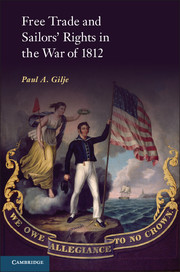13 - The Ordeal of Jack Tar
Published online by Cambridge University Press: 05 March 2013
Summary
The connection between free trade and the rights of man reflected the emerging connection between free trade and the rights of specific men – sailors. Before 1812 the phrase “sailors’ rights” had not yet been reified into an icon in the same manner as “free trade,” but as an idea it had an even greater popular appeal. As they did with free trade, Republicans and Federalists contested the idea of protecting sailors’ rights, as both parties claimed to sympathize with the ordeal of Jack Tar. All Americans agreed that the sailor was a central symbol for the new nation. The experience of the war against Tripoli enhanced that significance, especially for the Republicans, when sailors defended the nation and, in the case of the crew of the Philadelphia, were victims of captivity. Any threat to the mariner's liberty – his freedom in both real and symbolic terms – became increasingly important to many Americans. British impressment of American sailors, which had subsided as a practice with the Peace of Amiens, emerged as the central issue in the discussion of sailors’ rights after France and Great Britain renewed their war in 1803. Federalists at first minimized the threat of impressment, but still competed with the Republicans in claiming to represent the interests of seamen. That Federalist appeal grew during the controversy over the Embargo. President Thomas Jefferson and his secretary of state, James Madison, often defended sailors’ rights, but by 1807 sought to sidestep the problem of impressment in negotiations with Great Britain, since they were more interested in free trade than in sailors’ rights. Impressment, however, remained too big an issue for the Federalists to ignore entirely or for Jefferson and Madison to put on the back burner. Indeed, attacking impressment provided many Republicans an edge in claiming to speak in defense of sailors’ rights. This interest in impressment created a popular momentum all its own, regardless of the position of the Federalist Party or the Republican administration, and along with free trade the issue became the major explanation for the War of 1812.
- Type
- Chapter
- Information
- Free Trade and Sailors' Rights in the War of 1812 , pp. 171 - 189Publisher: Cambridge University PressPrint publication year: 2013



